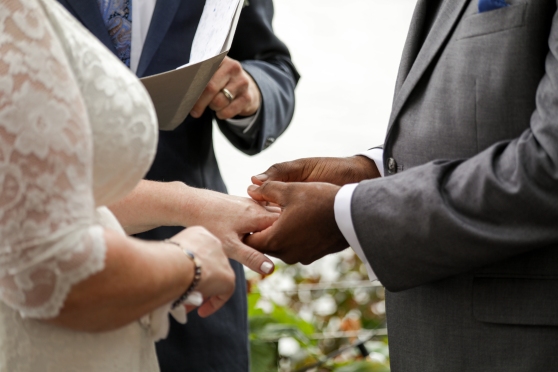
Merry Christmas



This is a sermon preached on November 18, 2018 at Ashland Presbyterian Church in Hunt Valley, MD. Isaiah 36:1-3,Isaiah 36:13-20,Isaiah 37:1-7,Isaiah 2:1-4
There has been a saying going around on social media the last few years, one that gets shared a lot this time of year. It says, “If you are more fortunate than others, build a longer table, not a higher fence.”
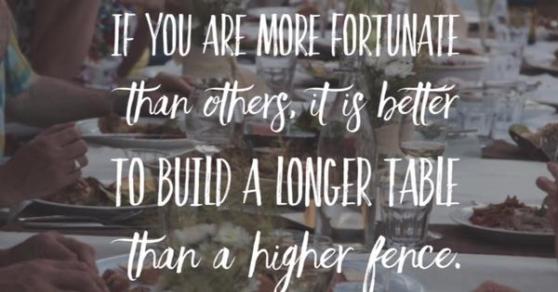
I love family meals. My family still sits at the dinner table regularly for an evening meal. There’s nothing better than the two of us, the four of us, and especially the six of us gathered around the table.
There is laughter, there is conversation, there is gratitude and sharing. It’s loud and rambunctious, it’s sometimes messy, and always entertaining. This week I will extend my table and put all the leaves in. I will round up extra chairs from the house and get out my great grandmother’s dishes and my grandmother’s crystal. We will use cloth napkins and I will make a dinner of love and care, a dinner of tradition and lots of butter.
For some of us, these are the sounds of Thanksgiving’s past, perhaps even its future, but not its present. For some of us we will gather together at our family’s dinner table, extended with all its leaves filled with anxiety and dread.
What will be said, who will be there, will we be able to avoid the landmines of “differences?” “Can’t we all just get along?” we will wonder to ourselves. “Can’t we put aside this warring madness for just one day?”
There are arguments that maybe we shouldn’t, that this is our chance to “turn the other side” and “bring them over to our side”. There are arguments that we should go into thanksgiving with our guard up, ready to fight the good fight.
So I had to laugh when I opened the narrative lectionary reading for today and it was about war and peace. As I contemplated changing it for our thanksgiving service to a psalm proclaiming gratitude to God for all our abundance, then I thought otherwise.
Maybe we should talk about war and peace, it may not be the most gratitude filled text, but it may just be a practical “how-to” guide to handle the American holiday of thanksgiving! The land of Judah is in the southern part of Israel. Israel was divided into two after Solomon’s son was defeated in war.
Hezekiah is the thirteenth king of Judah living in 700-600 BCE. He lives in the capital of Jerusalem, and like his sister country Israel the Assyrians have defeated his army and lands, an unstoppable force in this time. After defeat the king of Assyria sends a messenger to mock and scold not only the people of Judah but their God as well.
The King through his messenger declares that he is mightier than all the other gods of all the other lands he had defeated, and therefore is mightier too then this God in Israel. “Where is your God now?!?!”
When Hezekiah heard this he tore his clothes and covered himself in sackcloth. In other words, he mourned and grieved. When the prophet Isaiah gets wind of this he says to the king and his priests to not be afraid, that God will help them, but it will take time. God has not abandoned them.
The narrative lectionary does an interesting thing at this point. It has us turn back to Isaiah chapter two all the way from chapter 36 to remind us how we are to respond, what was foreshadowed for the people of God for this very moment. The people are to beat their swords into plowshares, and their spears into pruning hooks. Nation shall not lift up sword against nation and neither shall they learn war anymore.
The representative of the king of Assyria has just mocked not only the people and their king, but their God as well. This political war isn’t just one of land and kingdoms, but of power and domination over the very souls of the people, their very religion. This is very, very personal. You didn’t just insult my official representative; you insulted my God as well. Today in America we are not at war with each other, and I think it’s important to remember that.
However, I do not think it is a far stretch in today’s political climate to draw some parallels here. Poll after poll tells us that Americans are more divided today then ever before, if there is a comparable time, it is civil war era contention. Can we ever get along? Will we ever end this warring madness?
I bet the people of Judah were wondering the same thing.
Two weeks ago SNL’s Pete Davidson mocked then Texas republican nominee for U.S. House of Representatives and former Navy Seal, Dan Crenshaw for losing an eye in “war… or whatever”.
As you can image the interwebs went crazy. In an opt-ed for the Washington Post, now member-elect Dan Crenshaw said this:
I woke up on the Sunday morning after the show to hundreds of texts about what Davidson had said. A lot of America wasn’t happy.
I agreed. But I also could not help but note that this was another chapter in a phenomenon that has taken complete control of the national discourse: outrage culture. It seems like every not-so-carefully-worded public misstep must be punished to the fullest extent, replete with soapbox lectures and demands for apologies. Anyone who doesn’t show the expected level of outrage will be labeled a coward or an apologist for bad behavior.
I get the feeling that … Americans sigh with exhaustion — daily.
Was I really outraged by SNL? Really offended? Or did I just think the comment about losing my eye was offensive? There is a difference, after all. So I didn’t demand an apology and I didn’t call for anyone to be fired. That doesn’t mean the “war . . . or whatever” line was acceptable, but I didn’t have to fan the flames of outrage, either.
SNL reached for with an invitation for Mr. Crenshaw to appear on the show and on November 10 he did alongside the man who insulted him, Pete Davidson. Pete apologized and Mr. Crenshaw said they agreed that certain things, like Veteran’s wounds were off limits. As I read the article and watched the video this week I couldn’t help but hear Isaiah’s words echo in my head. “turn swords into plowshares”.
Turn a weapon of war into a tool for peace.
Why is a gardening tool a tool for peace is a wonderful and very long discussion for another day and one I very much enjoy having.
They are both made from metal, metal mined from the same mines, thrown into the same fires, the difference is how they are molded and shaped. To turn a sword into a plowshare will take time and energy.
It will take literal transformation but it can be done. In a time and place where our words can seem like war- I ask you, what would it take for you to show up at Thanksgiving dinner with a plowshare instead of a sword?
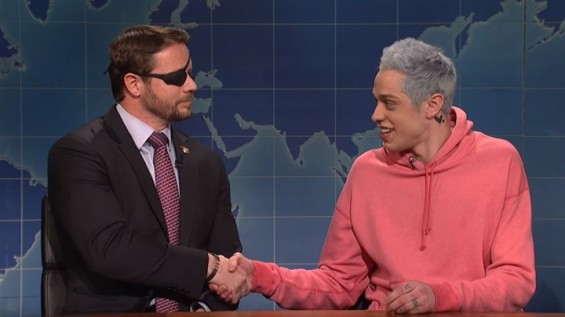
What would it take to meet your families with compassion instead of condemnation? Mr. Crenshaw continues in his opt-ed:
How, then, do we live together in this world of differing ideas? For starters, let’s agree that the ideas are fair game. If you think my idea is awful, you should say as much.
…People too often attack not just an idea but also the supposed intent behind an idea. That raises the emotional level of the debate and might seem like it strengthens the attacker’s side, but it’s a terrible way to make a point.
Assuming the worst about your opponents’ intentions has the effect of demonizing their ideas, removing the need for sound counter-reasoning and fact-based argument. That’s not a good environment for the exchange of ideas.
When all else fails, try asking for forgiveness, or granting it.
Friends, we all have a choice to make, not just this week, but every day. We can show up with swords ready to fight, ready to tear down and destroy the other, or we can turn those swords into plowshares, ready to do the hard work of peace and prosperity for all.
May it be so for you and for me.
To listen to the audio recording you may do so here.
We had our annual outdoor worship and picnic August 26, 2018 at Ashland Presbyterian Church. Here’s what we did.
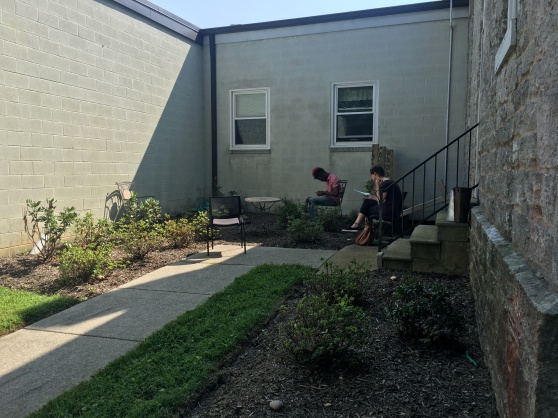
Prayer Station #1: Breath Prayer
In the beginning when God created the heavens and the earth, the earth was a formless void and darkness covered the face of the deep, while a breath from God swept over the face of the waters. –Genesis 1:1-2
A breath prayer is a type of prayer that allows us to connect with God no matter where we are or what we’re doing. In a breath prayer, we pray to the rhythm of our own breathing, which we intentionally slow down. The breath prayer can be a prayer in itself, or it can lead into further prayer. By practicing breath prayers regularly, you allow a “spirit break” that becomes as natural as breathing.
Here’s how you do it: Close your eyes. Breathe in slowly; then breathe out slowly. Repeat this several times. Say the first line of the breath prayer (while breathing in). For example: Lord. Then, breathe out slowly, give the second line of the breath prayer, have mercy. Repeat the prayer several times (it could be a four or five or several minutes worth, allowing other thoughts to disappear and concentrating on your breathing, essentially, you are not “saying” the word but “breathing” it) and then allow time for silence. Close this time of breath prayer with a simple prayer maybe “thank you Jesus for your love, Amen.” You may use one of the following breath prayers or create one of your own using a line of music, a poem, another Bible verse, and so on.
Spirit of the Living God, fall afresh on me.
Be still, and know God.
Create in me, a clean heart.
This is the day, the Lord has made.
Fear not, I am with thee.
Peace, be still. God, is here.
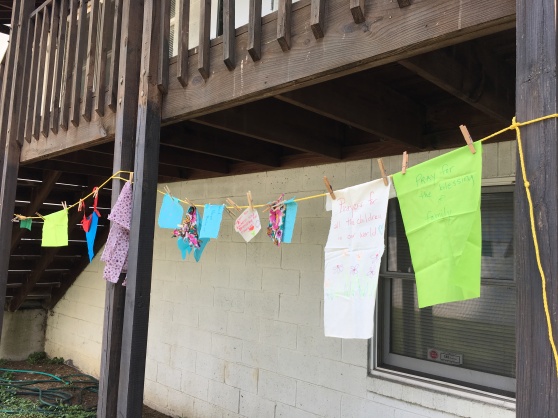
Prayer Station #2: Prayer Flags
Then Jesus led the disciples out as far as Bethany, and, lifting up his hands, he blessed them. While he was blessing them, he withdrew from them and was carried up into heaven. And they worshiped him, and returned to Jerusalem with great joy; and they were continually in the temple blessing God. -Luke 24:50-53
Prayer flags are colorful pieces of fabric with prayers inscribed on them. They are often found in the Himalayas to bless the environment around them. The belief is that as these prayers are blown by the wind, as they become frayed and tattered, the prayers bless the world. The wind carries the blessing into small villages and into bustling cities, into war-torn nations and to peaceful people. The wind carries a prayer of strength to that widow mourning the death of her husband. The breeze blows blessing into that home and over that newborn baby boy resting in the arms of his mother.
1. Pray and meditate. Search the caverns of your heart and mind for the prayers. Perhaps it is a prayer for peace or a prayer of thanks. Recall your day, your week. Did you witness or hear something that caused you to invoke God? Perhaps it was the man asking for money on the street corner. Pray with your kids. Ask them to come up with their own prayers and blessings.
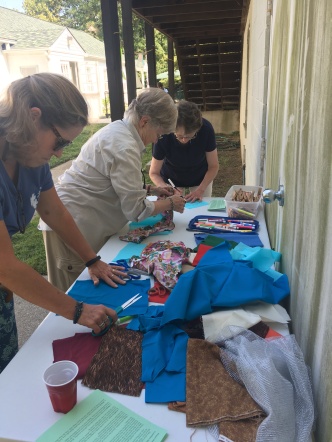
2. Craft the flags. As you cut the cloth or paper into squares, pray your prayer. Remember that each prayer you craft is an offering to God. Be artsy. Be plain. Write out your prayers. Draw something. Attach a photo. Let your children make their own; let them go crazy with their creativity.
3. Hang the twine somewhere that you will see it everyday. Maybe in your kitchen so you can gaze at the prayers each morning as you prepare for the day. Maybe in your backyard between two trees. Maybe even over your child’s bed. Make them visible.
4. Attach each prayer to the twine and let the Holy Spirit take over. Keep these prayers always on your mind. Visit the prayer flags daily. Pray the flags often.
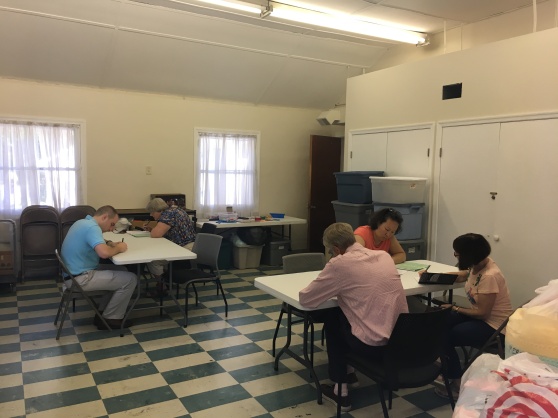
Prayer Station #3 Gratitude Journal
“Then one of them, when he saw that he was healed, turned back, praising God with a loud voice.” – Luke 17:15
As people of faith we know that living a life of gratitude is beneficial to our heath. But in our busy lives sometimes we forget to reflect of the abundance of blessings we have received. Using the materials provided create a gratitude journal. Place it on your nightstand or kitchen table so you remember to write in it each day. Here are some prompts to help you get started
• Use the prompt, “I’m grateful for…” and fill it in as completely as possible. Try to come up with five things each day.
• This is a twist on the first practice; instead of writing a full sentence on what you’re grateful for, just boil it down to one word. So it could be, “children” “brownie” “Earth” etc. Feel the essence of each word as you write it.
• Draw your gratitude each day, or do something creative. The instructions are simple – instead of writing your gratitudes in sentence form, draw them out. Or, paint them. Sing them. Dance them. Make a collage. Whatever suits your fancy.
• Write your daily gratitude, and share it with someone else. Once you’ve written it in your journal, write a note to the person you are thankful for, or a letter to someone letting them know the wonderful things happening in your life.
• If your life is so stressful you cannot think of anything to be grateful for, simply write something for the future. Write whatever your heart desires, and act like you already have it.
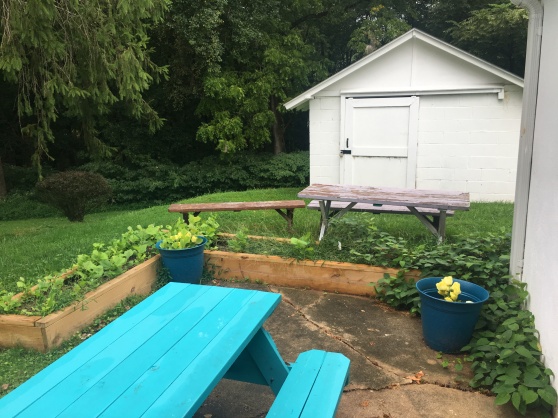
Station #4 Preparing the Soil
When a great crowd gathered and people from town after town came to him, he said in a parable: “A sower went out to sow his seed; and as he sowed, some fell on the path and was trampled on, and the birds of the air ate it up. Some fell on the rock; and as it grew up, it withered for lack of moisture. Some fell among thorns, and the thorns grew with it and choked it. Some fell into good soil, and when it grew, it produced a hundredfold.” As he said this, he called out, “Let anyone with ears to hear listen!” –Luke 8:4-8
Last spring raised beds were planted outside the fellowship hall kitchen to grow vegetables and herbs to be cooked for our dinners at Sarah’s Hope. The preschool children will be planting and learning about how food grows in the beds, but like any good gardener knows, the soil must be prepared. Pull the weeds away from the beds and prepare the pots for the new plants to grow.
As you pull the weeds consider the things in your life that need to be pulled away so you can flourish with what God has called you to be. Discuss these things with your neighbors or write them in your journal at a later date. Return to the garden in a month or two and notice the progress the “good soil” has provided for our ministries.

This sermon was preached at Ashland Presbyterian Church in Hunt Valley, Maryland on July 22, 2018. It is part of the Worship Series “The Gospel According to Mr. Rogers”.
When we talk about racism and the church, we in mainline Christianity have a lot to apologize for. When slave owners first introduced Christianity they did so exclusively through white preachers using scripture to justify slavery, the harsh conditions of their lives, and pushed themes of submission to their Lord and Masters.
But this was not the first time racism was used in Christianity, in fact, it has been an issue since it’s inception. It didn’t begin as black and white, but as Jew and Gentile.
It started with Jesus, when speaking to the Canaanite woman (Matthew 15:21-28). This foreign gentile (meaning non Jewish woman) asked Jesus to help her daughter who was processed by a demon. This issue was not that Jesus couldn’t do it, the issue was she was not of Jewish descent. Listen to the interaction:
24 Jesus answered, “I was sent only to the lost sheep of Israel.”
25 The woman came and knelt before him. “Lord, help me!” she said.
26 He replied, “It is not right to take the children’s bread and toss it to the dogs.”
(Yep. Jesus called the people of Israel hungry children, and her daughter a dog, but she was not having it)
27 “Yes it is, Lord,” she said. “Even the dogs eat the crumbs that fall from their master’s table.”
28 Then Jesus said to her, “Woman, you have great faith! Your request is granted.” And her daughter was healed at that moment.
As you have heard me preach before from this text, Jesus listens to the woman, and learns his own prejudice. But racism and pre-justice is a lesson that is passed down and integrated into, yes, into our religions.
After Christ’s death and resurrection, Simon, also known as Peter, was left as the head of the church, or the soon to be forming church, until a man named Saul, had a conversion to Paul.
Both were of Jewish descent, but in Paul’s conversation he had a revelation that Jesus’s message was for all people, not simply the people of Israel. So he spent his time planting churches, and telling people about Jesus who were gentiles, while Peter, focused on the people of Israel, until… Acts 10.
“For Luke, this moment is significant well beyond Peter’s life. This story is a powerful symbol of a promise prominent from the beginning of Luke’s gospel and throughout Acts, a promise represented most powerfully in the resurrection of Jesus. Without question, God’s spirit is moving. The only question is whether Peter, as well as the church, will sense the winds of change and follow God’s lead.
Though Peter finally comes to this insight in the dramatic story of Cornelius and his household, Luke has long been heralding this inclusive impulse.
After all, Jesus’ commission in Acts 1:8 declares that geographical bounds would not constrain the gospel. Peter himself proclaims anew the prophecy of Joel that the Spirit would dawn upon “all flesh” (Acts 2:17).
An Ethiopian eunuch has already received baptism (Acts 8:26-40). Even more, these promises began with the opening of Luke’s gospel. Simeon declares that Jesus would be both “a light of revelation to the Gentiles and for glory to your people Israel” (Luke 2:32).
Jesus’ first sermon ends rather inauspiciously when he reminds his neighbors that Elijah shared the goodness of God beyond the bounds of Israel. In other words, the Spirit long preceded Peter’s realization. Peter only came to realize the radical scope of this movement well after the Spirit had begun working.
Luke portrays this as a monumental speech. His thesis is a brief but powerful theological insight: “I truly understand that God shows no partiality” (cf. Romans 2:11).
No matter our place of origin, the same God reaches out to us; the same gospel calls us home. Social boundaries and ethnic differences are no obstacle to the gospel.[i]
As we have been traveling through our series on The Gospel According to Mr. Rogers, inclusion has been a big theme. Mostly the inclusion of children in their concerns and feelings about and for the world.
In today’s clip, we see Mr. Rogers living the gospel of inclusion in an obvious, but life changing way. Let’s watch…
In 1969, while Jim Crow laws were still in effect, a quiet Presbyterian minister and an African-American police officer show the world how to integrate swimming pools. Rogers invites; Clemmons accepts. As Clemmons slips his feet into the pool, the camera holds the shot for several seconds, as if to make the point clear: a pair of brown feet and a pair of white feet can share a swimming pool.
The clip we saw, was nearly 25 years later. A much older Rogers and Clemmons sit with their feet in a similar blue wading pool talking about the many different ways that children and adults say “I Love You”–from singing to cleaning up a room to drawing special pictures to making plays. As the scene ends, Rogers takes a towel and helps Clemmons dry his feet with a simple, “Here, let me help you.”
Cornelius was a Godly man; his Alms to the poor were recognized by God as a “memorial offering”, despite his being a gentile. Peter heard through his vision “What God has made clean, you must not call profane”.
Mr. Rogers reenacted this gospel through a foot washing on public television for the world to see. He put to life the word Paul brought to the Galatians “There is no longer Jew or Gentile, slave or free, male and female. For you are all one in Christ Jesus.”
This is the gospel of Christ, it may be a lesson sometimes hard to learn in the worlds in which we live, consistently trying to separate us, but we know, what Mr. Roger’s knew, we are all children of God, and special in God’s sight.
May it be so… Amen.
[i] https://www.workingpreacher.org/preaching.aspx?commentary_id=1261
This sermon was preached at Ashland Presbyterian Church on July 1, 2018 as part of the worship series, “The Gospel According to Mr. Rogers.”
Hebrews 12:1-2 and 1 Corinthians 11:23-26
Fred Rogers awoke every morning to a swim, weighting himself (which we will learn more about later), and silent prayer.
“Taking Time” was a gospel Mr. Rogers preached almost as much as “you are special”. He believed God was to be found in the silence. He believed the thing that was wrong with modern society was that we don’t take time. We need to slow down, to remember those who have helped us, we need to listen for God.
Now we’re about to watch a video which is a very similar speech the one Fred Rogers gave at every award he received and I would like you to pretend you are in the audience and that he is speaking to you, let’s watch:
Who has helped you to love the good within in you?
Who has wanted the best of you? Who has helped you to become who you are?
When you came in you were given a thank you note. We’re going to take a few moments together and write notes to the person you thought of. If they are in heaven, then maybe there is a relative you could send it to who would love to hear about how their loved one helped you, or you can leave it at a place of memory for them, or you can leave it with us and we will cherish it for you.
Let’s take a few moments… (write thank you notes)
Taking time to remember, it was the one thing Jesus asked at the Last Supper of this disciples, remember me. May we all take more time in our days, weeks and years.
Every spiritual director I have ever had has asked this question: Where is God in all this? (“this” being pain, or overwhelming, or life) This is also a question pastors and any religious person asks, but I identify it most with spiritual direction.
I admit, for a long time the answer was, “you know, in the middle, stirring the pot, comforting, pushing me to be better.” I didn’t always find it the most helpful question. After all, when your theological beliefs so deeply affirm that God is in everything and everywhere it’s a hard question to answer. But the “simple” question is actually a very complex one.
Where is God in all this?
“God is everywhere”. A good spiritual director would call bullshit on me right here. (“good” being relative and for me…)
God is everywhere! Bullshit.
Where is God in all this?
I don’t know. Somewhere? Nowhere? Crying in the corner crouched in the fetal position?

I admit that whenever I get asked this question I see an image like I am playing hide and seek with God. God being hidden and me walking around in the dark with a flashlight seeking.
I really don’t mean to make fun, it’s an important question and a serious one, but one I struggle to take seriously because it requires such depth. Such spiritual and emotional work, such admittance that I am not really in control.
You know… faith.
Where is God in all this? I don’t know I TOO TIRED TO FIND GOD!
We take in information and have more choices then any person ever before us. It’s not just a 24 hour news cycle, but I know everything that’s happening is my hundred’s of Facebook friend’s lives right now. I have more decisions over which cereal to buy than my ancestors did about what they ate in a year.
My brain cannot handle it all.
And then you want me to process where God is in the midst of it all? It’s too much. Too damn much.
But honestly, truthfully, the cost of not asking this question is too high.
Without taking the time to meditate, to reflect, to shut down, to feel – I am doing myself and everyone around me a disservice.
It’s not enough for me to go around telling people what my faith is or what my faith believes, or even what the bible says, for without requiring myself to take the time to connect with God, to find God in my midst then I am but a noisy gong or a clanging cymbal.
And there’s enough noise in the world.
Where is God in all this? God is in the love. Where is love in all this? Am I connecting to it? Am I allowing myself to feel love? Am I allowing myself to give love? Am I allowing others to love me?
The price of continuing on without answering these questions is simply too high. I have to stop, breathe, reflect, and feel.
Where is God in all this? God is in the love, always. Always in the extension of love. Now say it again, not just with feeling but by feeling.
Be gentle with yourselves friends. For you are so very loved, even if you (or I) can’t feel it.
This Sermons was preached at Ashland Presbyterian Church in Hunt Valley, MD on June 24, 2018. It is the third in the sermon series, The Gospel According to Mr. Rogers.
A Prophet is one who proclaims and interprets divine revelation. It is descriptive of one who speaks forth God’s word.
I am not the only one in the congregation who has said this, I have gotten the comment from many of you as well. The confession is this: “You know, I didn’t always like Mr. Rogers.”
It never had anything to do with the message, many of you described how your children loved the show and you would sit in wonder at how this hokey, slow talking man could captivate their attention.
By the time I was born Mr. Rogers’ Neighborhood had been on public television for 12 years. I cannot say that as a child I remember specifics about the show and it wasn’t until the Internet and having my own children that I rediscovered “Mr. Rogers’ Neighborhood.”
For my generation on of the clips that endeared me to Mr. Rogers was not from the show itself, but watching this kind, gentle, albeit nervous man testify before congress. It was the most unlikely of casts. Watching these hard politicians and this soft man talk to each other, I watch it with hope that if we could just listen to each other, and I watch it with the ear of hearing a prophet speak truth to power.
You see of all the things we can call Mr. Rogers’ I feel that Prophet would be way, way down the list, but every day, for almost 50 years he spoke the word of God to children across the world.
In the still, soft voice, he declared “You are special, just by being you.” “Your feelings are real and valid.” “It’s okay to wonder.” “I want to be your friend, I like you.” The Prophet is to be the voice of God in the midst of the harsh world. Jeremiah would walk up and down the streets criticism the King and the people when they would step away from God’s call. But he was also there to reassure them and bring them hope.
When Jeremiah is called by God Jeremiah responds that “no, no God, you must have made a mistake, I am too young” and God proclaims, “no I know you fully, you are special, just by being you.” This message runs contrary to the human angst that in a vast universe our small lives might be meaningless.
They are not.
In a world where the lives of so many children – street children, child laborers, children living in the midst of violence, neglected, detained or abused– appear to assert a different reality. You are special, just by being you. It is an audacious faith in a God who not only affirms, but creates individual human worth and dignity.
The call of a prophet takes on many forms and the unlikeliest characters are called. You too, are called to stand up for your faith, in your own way. Remind people that they are whole and beloved, by shouting in the streets or one person at a time. In song and prayer or through presence and power.
Being who God created and called you to be is your greatest gift to the world, none of us should “hide it under a bushel” to quote another prophet, but embrace without excuse, the reality of being fully known and loved.
You are special, just by being you.
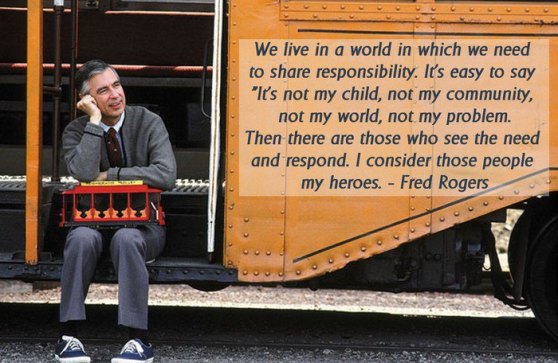
This sermon was preached at Ashland Presbyterian Church in Hunt Valley, Maryland on June 17, 2018. It is the second week of the Worship Series “The Gospel According to Mr. Rogers”.
Hello Neighbors!
In 1968 when Fred Rogers started Mr. Rogers’ Neighborhood he set out to change children’s television from consumer driven slapstick, to a show teaching children about life, love, and make believe.
He started every show with the song “Won’t you be my Neighbor?” and that was the question he was asking every single day.
Fred was a good neighbor. He was kind and gentle, he was loving and accepting. He never turned away a visitor and always listened to their stories with patience and grace.
One of the things I realized as I dug into this series is that Fred wasn’t teaching us (the viewers) how to be good neighbors by instruction. He was a good neighbor and lead by example. We learned how to be good neighbors by watching him.
Our job, our responsibility, was to respond to the invitation he proposed in mutual relationship at the beginning of each episode: “Won’t you be my neighbor?” And you wanted to say YES! After all, he’s always wanted a neighbor just like us!
In our scripture lesson this morning we get another story of a good neighbor. The story of the man who falls into the hands of robbers is a man in need of help, desperate help, as he is described in bad shape being left half dead.
A priest and a Levite avoided the man, crossing to the other side of the road, but the foreigner, the Samaritan, takes the man, cares for him out of his own pocket and makes sure he gets continued care.
The Samaritan answers the call of the dying man, “Won’t you be my neighbor?” and responds with a room and fresh bandages and an ongoing relationship of care. And by Jesus emphasizing the priest and the Levite ignoring the man, but the foreigner helping, Jesus is emphasizing to us that our neighbors aren’t simply the people who live down the street or speak our language, or even pray to our same God. All are our neighbors.
So… Which of these three, do you think, was a neighbor to the man who fell into the hands of the robbers? Jesus asks. The one who showed mercy. And Jesus instructs the lawyer to “go and do likewise.”
Showing mercy, in other words, is being a neighbor.
But this is not a stand alone story, scripture explicitly gives this mandate “Love your neighbor” over 40 times and is implied hundreds. Even Paul in Romans 13 lifting loving your neighbor as the fulfillment of the law.
As we move through this series, we will be looking to embody the gospel through Mr. Rogers, we will strive to, in our own way, become more Mr. Rogers like, more neighborly, which is, merciful and loving.
As we enter this series, we must first start with ourselves:
Am I a good neighbor? Do I show mercy and love? Am I seeking others our in mutual invitation to be in merciful relationships with me?
What would it look like for me to be a good neighbor? And ask others to be our neighbor?
For our church to be a good neighbor? And ask others to be our neighbor?
For our city to be a good neighbor? And ask others to be our neighbor?
For our country to be a good neighbor? And ask others to be our neighbor?
As we watch this popular clip from the show I want you to observe all the ways Mr. Rogers invites Jeff Erlinger to be his neighbor in merciful, mutual relationship.
I want you to notice how he meets Jeff on the steps and sits to look him in the eye.
I want you to notice how he lets Jeff talk about things that may make us or others uncomfortable, but are very natural to him, how he lets him take his time showing off and feeling special.
Being neighborly may mean interacting with people who are different, who look and sound different, who may not be able to do the same things you do, who may sometimes make you uncomfortable.
Being neighborly means breaking out of your comfort in order to extend mercy. It means being vulnerable to learn something new, and accept someone not for what they can give you or do for you, not for what they have, but who they are.
Let’s take a look:
Go and do likewise

I have been working on a Summer Worship Series on The Gospel According to Mr. Rogers for the church I serve. We kicked off last week with Children’s Day and a theme of “You Are Special”.
This week we ask the question “Who is my neighbor?” and look through the lens of the Good Samaritan Story.
Like all things Mr. Rogers the keys are kindness and helping, one person at a time, one community at a time- and not just *your* community, as a minister Mr. Roger’s sense of community was all the world.

This is the cover of the bulletin this week.
As I do the (sometimes) tedious job of writing liturgy for this sermon series I couldn’t be more excited about I take short breaks between calls to worship, confessions, and hymns to look at email and social media.
It started last week when the video of Senator Jeff Merkley was denied entry into a detention center for migrant children. This started to highlight the rule of separating children from their parents as a “deterrent” to keep people from crossing the US boarder illegally.
The most recent story as I write this is a baby taken from a mother while breastfeeding.
I’m sick. I’m sad. It hurts.
Who is my neighbor? Like Mr. Rogers said, the world is and I share responsibility, yet I feel powerless.
I call my senators, and feel hopeless, I don’t understand what’s becoming of humanity and the disassociation I think people are having. The same people who support these policies are the same people who say they just want some “decency” back.
It is not unlike the stories I read last week when my husband and I visited the National Museum of African American History and Culture in DC. In the very beginning after the journey downward into darkness there is an exhibit of artifacts from the São José Shipwreck. I could not find the quotes that accompany the artifacts, but they are from the crews of these enslavement ships talking not about the deep guttural cries coming from a people torn from their homes and imprisoned in such inhumane circumstances.
Many crew members killed themselves from the pain of the sounds.
Who is my neighbor? And what kind of neighbor am I when I am jailing your children?
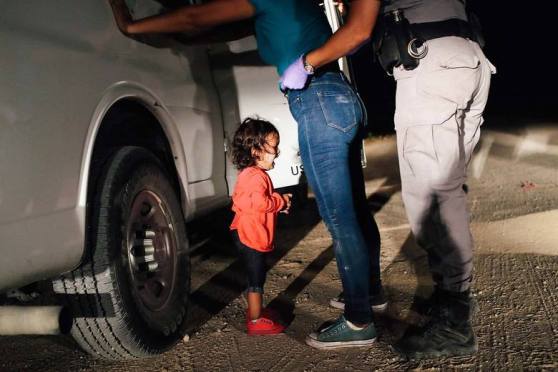
I turn again to social media and my timeline is filled with stories like these. I can hear the heart wrenching screams of parents and children.
Many of my friends are asking the question that if these were the practices of Egypt when Joseph and Mary had appeared at the boarder with their infant son, what would have happened (Matthew 2:13)?
Who is my neighbor?
What is my responsibility?
What kind of neighbor am I?
Migrant workers jailed for crossing our boarders to pick our tomatoes risking their health not only in the sun, but from all the pesticides on our food so we have a perfect unblemished slice on our Wendy’s burger.
Have we no shame? Do we not hear their cries?
I don’t have an answer, just a paralyzing sadness.

“Racism is exhausting” my friend exclaims to me over text message after a particularly hard bought of covert racism my husband is experiencing. “Yes, yes it is!” I exclaim back.
Today is Loving Day. June 12, 1967 the Supreme Court struck down anti-miscegenation laws in 13 states. It’s a day celebrating interracial relationships and marriage. “Loving” refers to Mildred and Richard Loving who won the case against the state of Virginia.

Last week my husband and I visited the National Museum for African American History and Culture in Washington, DC. It was heavy and difficult. There was a lot to process. At the end of the second floor there was a wall of Jim Crowe era laws that had been broken and the states they had been broken in. The majority of them were anti-miscegenation.
Growing up in a racist household I can tell you there is a special place of racism for people who try to “mix” races. However, seeing it in “black and white” (pun intended) the gravity of it hit me, admittedly naively, how such a short time ago my love and marriage would have been illegal. My family would have been illegal.
And it is still looked down upon.
This is not a foreign concept to me as I fought for same-sex marriage before it was legal. Again, it’s not that I didn’t know or that I haven’t been called names by others since being with my husband, but as I stood there and looked at those lists of charges it felt so personal.
As we walked up another floor and the entertainment industry of the 70’s, 80’s and 90’s were in front of us. On one display was Harry Belafonte and Petula Clark in 1968, the display was about the first interracial “touch” on tv. Here’s the video, it happens at the 2:13 and is the most natural thing in the world. It was all over the press when a Chrysler V.P. objected.
As a person who uses physical touch as a love language I suddenly was very aware of how much my husband and I touch. We had held hands throughout the museum, he had guided me with this hand on the small of my back. I had rubbed his back at certain moments as he read about racial slurs, beatings, humiliation and chains his ancestors wore, and we had kissed, small pecks on the top of the head, or the occasion kiss on the lips (scandalous).
So I celebrate today, because I’m in love. I love my husband for all that he is, with all that I am. Happy Loving Day!
